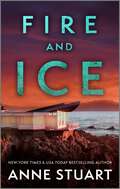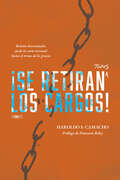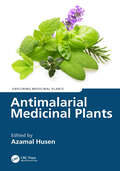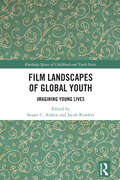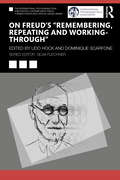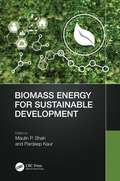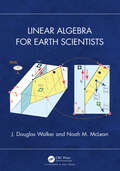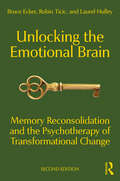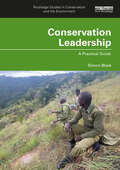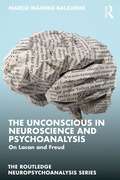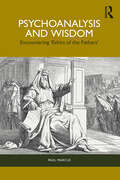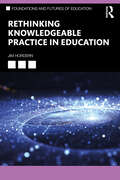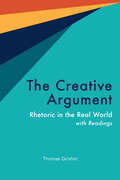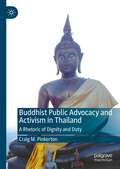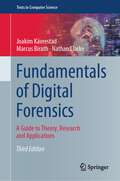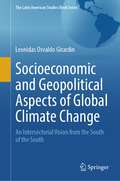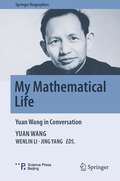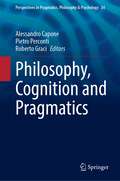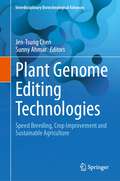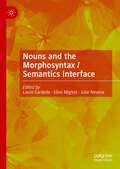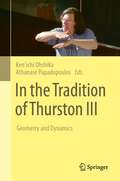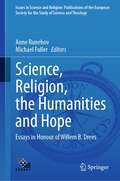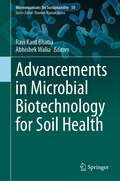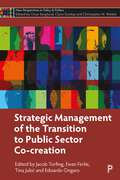- Table View
- List View
Fire and Ice (The Ice Series #5)
by Anne StuartThe stunning finale to RITA Award-winner Anne Stuart&’s The Ice Series brings us back to Japan, where deadly machinations have an odd couple in their crosshairs.In the wake of a failed love affair, Jilly Lovitz takes off for Tokyo. She&’s expecting to cry on her sister&’s shoulder, then spend a couple months blowing off steam in Japan. Instead, she&’s snatched away on the back of a motorcycle, narrowly avoiding a grisly execution attempt meant for her sister and brother-in-law.Her rescuer Reno is the Committee&’s most unpredictable agent. They&’d met once before and the attraction was strange—opposites in more way than one—but electric. Now Reno and Jilly are pawns in a deadly tangle of assassination attempts, kidnappings, and prisoner swaps that could put their steamy partnership on ice.Previously published.
Wild Iris Ridge (Hope's Crossing #7)
by RaeAnne ThayneLucy Drake and Brendan Caine have only one thing in common… And it's likely to tear them apart. Because it was Brendan's late wife, Jessie—and Lucy's best friend—who'd brought them together in the first place. And since Jessie's passing, Brendan's been distracted by his two little ones…and the memory of an explosive kiss with Lucy years before his marriage. Still, he'll steer clear of her. She's always been trouble with a capital T. Lucy couldn't wait to shed her small-town roots for the big city. But now that she's back in Hope's Crossing to take care of the Queen Anne home her late aunt has left her, she figures seeing Brendan Caine again is no big deal. After all, she'd managed to resist the handsome fire chief once before, but clearly the embers of their attraction are still smoldering….
¡Se Retiran Todos Los Cargos!: Relatos Devocionales Desde la Corte Terrenal Hasta el Trono de la Gracia, Tomo 2 (¡Se Retiran Todos Los Cargos! #2)
by Haroldo S CamachoSe siente un profundo temor cuando uno es llamado a comparecer ante un juez. Aunque solo sea por una multa de trá nsito. Especialmente si uno comparece sin un abogado. ¿ Cuá l será la multa? ¿ Habrá una defensa? ¿ Me declaro culpable, o pido un juicio? Pero cuando comparecemos ante el tribunal de Dios, todo temor se disipa: ¡ se retiran todos los cargos! Pero ¿ es verdad realmente? Hemos hecho tantas cosas que estamos convencidos de que no tenemos perdó n. Pensamos: « Tal como no se puede confiar plenamente en el sistema judicial, tampoco se puede confiar plenamente en el perdó n de nuestros pecados» . Pero el martillo del juez interrumpe nuestros titubeos: « Por causa de Cristo, se retiran todos los cargos, no hay nada pendiente. ¡ El defendido queda perdonado! ¡ Para siempre!» .El segundo tomo de ¡ Se retiran todos los cargos! continú a el viaje desde la corte terrenal hasta el trono de la gracia de Dios, en tanto Haroldo Camacho nos muestra que cada pecador recibe un veredicto de inocente, ¡ sin importar cuá n culpable sea!
Antimalarial Medicinal Plants (Exploring Medicinal Plants)
by Azamal HusenMalaria continues to affect a large population of the world, especially in third world countries. The spread of drug-resistant parasites demonstrates the need for antimalarial agents with various modes of action. The search for remedies derived from medicinal plants for the treatment of malaria is reliant on accurate ethnobotanical and ethnopharmacological information obtained from traditional medical practitioners. Antimalarial Medicinal Plants provides information on bioactive compounds and therapeutic potentials of several antimalarial plant species found around the globe. This book evaluates these plant species with respect to their biology, diversity, distribution, and pharmacological values.A volume in the Exploring Medicinal Plants series, this book highlights trends, technologies, processes, and services important to and necessary for efficient production, use, and understanding of medicinal qualities of antimalarial plants. It critically examines claims made by traditional medical practitioners with scientific validations for safe herbal drug formulation. It is a reference work for researchers of herbal medicine, traditional healers, pharmacists, and students associated with plant sciences and economic botany.
Film Landscapes of Global Youth: Imagining Young Lives (Routledge Spaces of Childhood and Youth Series)
by Stuart C. Aitken Jacob RowlettThis book explores the dynamic landscapes of global youth through spatially grounded chapters focused on film and media. It is a collection of incredible works concerning children and young people in, out, and through media as well as an examination of what is possible for the future of research within the intersections of geography, film theory, and children’s studies.It contains contributions from leading academics from anthropology, sociology, philosophy, art, film and media studies, women and gender studies, Indigenous studies, education, and geography, with chapters focused on a spatial area and the representations and relationships of children in that area through film and media. The insights presented also provide a unique and eclectic perspective on the current state of children’s research in relation to the ever-changing media landscape of the 21st century. Film Landscapes of Global Youth approaches the subjects of children and young people in film and media in a way that is not bound by genre, format, medium, or the on-/off-screen binary. Each chapter offers an insightful look at the relationships and portrayals of children and young people in relation to a specific country, culture, or geographic feature.This book is a must-read for anyone interested in the intersections between geography, young lives, and the power of film, television, social media, content creation, and more.
On Freud’s “Remembering, Repeating and Working-Through” (The International Psychoanalytical Association Contemporary Freud Turning Points and Critical Issues Series)
by Udo Hock Dominique ScarfoneIn On Freud’s “Remembering, Repeating and Working-Through” international contributors from a range of psychoanalytic backgrounds reflect on this key 1914 paper.Each chapter considers an aspect of Freud’s original work, addressing both the theoretical and clinical dimensions of the paper and incorporating contemporary perspectives. Bringing out all three aspects of the paper’s title, the contributors consider the issues raised by the so-called change in psychoanalytic paradigm, from the classic central concern of remembering to a clinical experience which prioritises enactment and repetition. The reflections on this important paper demonstrate how it goes beyond technique to open new vistas on the conception of psychoanalysis as a whole.On Freud’s “Remembering, Repeating and Working-Through” will be essential reading for psychoanalysts and psychoanalytic psychotherapists in practice and in training. It will also be of interest to readers seeking a deeper understanding of current Freudian thinking.
Biomass Energy for Sustainable Development
by Maulin P. Shah Pardeep KaurThe potential future fluctuations in energy security and potential climate change impacts require an emphasis on clean and renewable energies to safeguard the environment as well as economic livelihoods. The current recalcitrant nature of biomass processing has led researchers to find the most suitable technique for its depolymerization, as well as various strategies to pretreat the biomass which include physical, thermochemical, and biochemical methods and a combination of these. Biomass Energy for Sustainable Development examines how optimal biomass utilization can reduce forest management costs, help mitigate climate change, reduce risks to life and property, and help provide a secure, competitive energy source into the future.Features: Provides a comprehensive review of biomass energy and focuses on in-depth understanding of various strategies to pretreat biomass including physical, chemical, and biological Explores multidisciplinary, novel approaches including AI for furthering the understanding and generation of models, theories, and processes in the field of bioenergy Covers the sustainable development goals for bioenergy, including the related concepts of bioeconomy and the potential environmental impact from reliance on bioenergy
Linear Algebra for Earth Scientists
by J. Douglas Walker Noah M. McLeanLinear Algebra for Earth Scientists is written for undergraduate and graduate students in Earth and Environmental sciences. It is intended to give students enough background in linear algebra to work with systems of equations and data in geology, hydrology, geophysics, or whatever part of the Earth Sciences they engage with.The book does not presuppose any extensive prior knowledge of linear algebra. Instead, the book builds students up from a low base to a working understanding of the sub t that they can apply to their work, using many familiar examples in the geosciences.Features Suitable for students of Earth and Environmental Sciences Minimal prerequisites — written in a way that is accessible and engaging for those without a mathematical background All material presented with examples and applications to the Earth Sciences
Unlocking the Emotional Brain: Memory Reconsolidation and the Psychotherapy of Transformational Change
by Bruce Ecker Robin Ticic Laurel HulleyThis highly influential volume, now in a much-expanded second edition, delivers major advances for psychotherapy, all empirically grounded in memory reconsolidation neuroscience. A great increase of therapeutic effectiveness can be gained, thanks to a clear map of the brain's innate core process of transformational change—a process that does not require use of any particular system or techniques and is therefore remarkably versatile. Twenty-six case examples show the decisive ending of a vast range of major symptoms, including depression, anxiety, panic, shame, self-devaluing, anger, perfectionism, alcohol abuse, sexual aversion, compulsive eating and obesity, paralyzed self-expression, and teen ADHD—all transformed through deeply resolving underlying disturbances such as complex trauma, lifelong oppression by systemic racism and homophobia, childhood sexual molestation, parental narcissistic domination, violent assault trauma, natural disaster trauma, and childhood traumatic aloneness and neglect. This is a transdiagnostic, transtheoretical, lucid understanding of therapeutic action, based, for the first time in the history of the psychotherapy field, on rigorous empirical knowledge of an internal mechanism of change, and it achieves a fundamental unification of the confusingly fragmented psychotherapy field: diverse systems no longer seem to belong to different worlds, because they now form a wonderful repertoire of options for facilitating the same core process of transformational change, as shown in case examples from AEDP, Coherence Therapy, EFT, EMDR, IFS, IPNB, ISTDP, psychedelic-assisted therapy, and SE. It's now clear why therapy systems that differ strikingly in technique and theory can produce the same quality of liberating change. Practitioners who value deep connection with their clients are richly rewarded by the experiential depth that this core process accesses, where no awareness had previously reached, whether sessions are done in person or via online video. It is an embarrassment of riches, because in addition we gain the decisive resolution of several longstanding, polarizing debates regarding the nature of symptom production, the prevalence of attachment issues, the operation of traumatic memory, the functions of the client-therapist relationship, the role of emotional arousal in the process of change, and the relative importance of specific versus non-specific factors.
Conservation Leadership: A Practical Guide (Routledge Studies in Conservation and the Environment)
by Simon BlackThis book is an important guide for individuals seeking to develop and grow their leadership skills in the wildlife conservation sector, across varied disciplines such as environmental management, conservation biology, and ecotourism.Conservation Leadership addresses what leadership is, why it is important, and how to be an effective leader. It identifies the common pitfalls or mistakes in a leader’s thinking or behaviour, and the unexpected consequences or responses which can arise, and then explores more helpful alternative approaches to leadership. The book is divided into three parts: Part I: Leadership principles Part II: Four areas of profound theory: knowledge, psychology, systems, and variation Part III: Skills and competencies for conservation leaders It focuses on contextual and organisational challenges in conservation, including limited resources, remote locations, fragile species of concern, politics, community conflict, crime, and commercial pressures. The scope is global, using diverse examples such as sea turtle head-starting in South Asia, reforestation in North Africa, bird conservation in North America, human–wildlife interactions in the Himalayas, and post-colonial issues in the Caribbean. Case studies illustrate key learning points from small local teams through to global transnational initiatives. Exercises in each chapter enable the exploration of less-familiar topics, including interpersonal skills, goal setting and performance measurement, plus a unique research-derived conservation leadership self-assessment tool.This book is an essential reading resource for professionals and senior leaders in the wildlife management and conservation sector, as well as students on biodiversity conservation, wildlife conservation, and environmental management courses.
The Unconscious in Neuroscience and Psychoanalysis: On Lacan and Freud (The Routledge Neuropsychoanalysis Series)
by Marco Máximo BalzariniThe Unconscious in Neuroscience and Psychoanalysis presents a unique and provocative approach to the assimilation of these two disciplines while offering a thorough assessment of the unconscious from a neuropsychoanalytic and Lacanian perspective.Marco Máximo Balzarini offers a comprehensive overview of Freud’s theory of the unconscious and its importance within psychoanalysis, before looking to how it has been integrated into contemporary neuropsychoanalytic work. Paying close attention to the field-defining work of neuropsychoanalysts such as Mark Solms, Francois Ansermet, and Pierre Magistretti, Balzarini considers the dichotomy between neuroscience and psychoanalysis, and the omnipresent debate on if and how they should be integrated when working with the unconscious. Throughout, he provides a fascinating Lacanian interpretation, showing how the work of Lacan can offer a new way of developing the dialogue and understanding around this vital topic.Part of the Routledge Neuropsychoanalysis Series, this book will be of interest to any psychoanalyst seeking to explore the foundations of the relationship between neuropsychoanalytic and Lacanian ideas in their clinical and theoretical work.
Psychoanalysis and Wisdom: Encountering ‘Ethics of the Fathers’
by Paul MarcusPsychoanalysis and Wisdom applies psychoanalytic insights into one of the great examples of wisdom literature, the Ethics of the Fathers, an ethical tractate of the Talmud.Paul Marcus quotes key passages from the Ethics of the Fathers, providing a psychoanalytic commentary to enlarge and deepen our understanding of its contents, focusing primarily on what constitutes a flourishing life. Marcus then considers what psychoanalysis can provide in its engagement with this classic of the wisdom teachings, such as illuminating aspects of the Ethics that are overlooked or underappreciated, and how “pearls of wisdom” from the Ethics can be incorporated into psychoanalytic theory and practice. The book contains clinical material as well as the insights of philosophers like Martin Buber, Gabriel Marcel and Emmanuel Levinas.Psychoanalysis and Wisdom will appeal to readers interested in psychoanalysis and psychotherapy and to academics and students of psychoanalytic studies, religious studies, Judaic studies and philosophy.
Rethinking Knowledgeable Practice in Education (ISSN)
by Jim HordernThe concepts of knowledge and practice are frequently discussed in education – but what is meant by these ideas, and how do they relate to each other? Drawing on recent research, this book breaks new ground to provide novel approaches to conceptualising educational practice, educational judgement and professional knowledge.This text focuses on the relationship between knowledge and practice in the study of education, developing the notion of ‘knowledgeable practice’ with the aim of rethinking how we understand the knowledge-practice relation in fields such as professional and vocational education, teaching and curriculum studies. It builds on studies in the sociology of educational knowledge and on theories of expertise and practice which emerge from more philosophical traditions.By developing a nuanced notion of the relation between knowledge and practice that can serve in the further exploration of policy and practice contexts in education, this book encourages critical engagement with how education is conceptualised in the light of the ongoing and emerging challenges that educators are facing today.
The Creative Argument: Rhetoric in the Real World, with Readings
by Thomas GirshinThe Creative Argument sets itself apart from its competitors by presenting a series of compelling works of literary nonfiction that challenge what students think they know about arguments. Each chapter begins with an engaging argument from a work of nonfiction, followed by an in-depth yet accessible analysis of a key aspect of argumentation. Suitable for both courses in argument and first-year writing, the principles and strategies outlined in the text help students become more creative and critical as rhetoricians, both inside the classroom and out.
Buddhist Public Advocacy and Activism in Thailand: A Rhetoric of Dignity and Duty
by Craig M. PinkertonThis book studies Buddhist public advocacy and activism in Thailand—a movement often broadly called socially engaged Buddhism—from the perspective of rhetorical studies, specifically, on humanizing and dehumanizing communication practices. In modern Thailand and historical Siam, Buddhism has been integral to the social change processes shaping civil society and an emerging democracy. This study examined two problems: How do contemporary Buddhists in Thailand use rhetorical practice to influence the way the issues they work on are understood, and how do these Buddhists justify their advocacy and activism in rhetorical practice? To the first, a rhetoric of dignity, or humanization, was the central answer. To the second, a rhetoric of duty was the central answer. For researchers in Southeast Asian Studies, Thai Studies, and Buddhist Studies, this book offers a fresh perspective on socially engaged Buddhism through the lens of the communication discipline. For researchers in Psychologyand Communication, it sheds light on the understudied practices of humanizing communication. The bulk of the current research is focused on its opposite—dehumanization—and most of this literature is in the field of psychology even though humanization and dehumanization are fundamentally and ontologically communication phenomena. For researchers within the field of Communication and Rhetorical Studies, this book advances innovations in the emerging practices of rhetorical field methods by applying rhetorical criticism to interview data in a new way and provides a non-western perspective on communication and rhetorical theory for which there has been continual calls.
Fundamentals of Digital Forensics: A Guide to Theory, Research and Applications (Texts in Computer Science)
by Joakim Kävrestad Marcus Birath Nathan ClarkeThis textbook describes the theory and methodology of digital forensic examinations, presenting examples developed in collaboration with police authorities to ensure relevance to real-world practice. The coverage includes discussions on forensic artifacts and constraints, as well as forensic tools used for law enforcement and in the corporate sector. Emphasis is placed on reinforcing sound forensic thinking, and gaining experience in common tasks through hands-on exercises.This enhanced third edition describes practical digital forensics with open-source tools and includes an outline of current challenges and research directions.Topics and features:Outlines what computer forensics is, and what it can do, as well as what its limitations areDiscusses both the theoretical foundations and the fundamentals of forensic methodologyReviews broad principles that are applicable worldwideExplains how to find and interpret several important artifactsDescribes free and open-source software toolsFeatures content on corporate forensics, ethics, SQLite databases, triage, and memory analysisIncludes new supporting video lectures on YouTubeThis easy-to-follow primer is an essential resource for students of computer forensics, and will also serve as a valuable reference for practitioners seeking instruction on performing forensic examinations.
Socioeconomic and Geopolitical Aspects of Global Climate Change: An Intersectorial Vision from the South of the South (The Latin American Studies Book Series)
by Leonidas Osvaldo GirardinThis book discusses climate change from an academic point of view centered on and from Latin America. Although climate change is a global issue, there has been a notable lack of input from the Latin American perspective, which means that many Latin American intellectuals often bring ideas, tools and potential solutions proposed by external, international research centers or organizations to the region. This book embraces a Latin American viewpoint to critically engage the problem and many of the concepts used in the analysis of climate change.The text emphasizes heterogeneity as an essential factor that cannot be absent in the analysis of how to understand and face the challenges posed by climate change. This heterogeneity refers not only to the magnitude of the impact that different regions will experience (including in their productive activities, ecosystems and social groups), but also to their contexts and capacities. Different countries' and regions' historical accumulated emissions—the primary cause of the current atmospheric concentrations of greenhouse gases—can inform current responsibilities, and their diverse productive structures will also contribute to different baselines in energy, agriculture and other sectors. Asymmetries in economic, technological and political capacities to face climate-related challenges will influence the social and economic costs of potential adaptation and mitigation measures.Using this conceptual approach, the book focuses on some of the main climate change-linked impacts expected in the region, such as effects on semi-arid ecosystems, and feasible, sector-specific adaptation measures. Furthermore, it contextualizes mitigation measures that appear on the international agenda (including the utilization of economic instruments to flexibilize the fulfillment of climate commitments) in the Latin American region.Socioeconomic and Geopolitical Aspects of Global Climate Change: An Intersectorial Vision from the South of the South offers socioeconomic and geopolitical analysis from the perspective of a region that is going to suffer impacts disproportionately greater than its historical and current responsibility in triggering this global environmental threat.
My Mathematical Life: Yuan Wang in Conversation (Springer Biographies)
by Yuan WangThis book is an autobiographical interview with Chinese Academician Yuan Wang on his experience in mathematical research. The book looks back on Wang's collaboration with his teacher Hua Loo-Keng and younger scholars, offering insights into fruitful cooperation in mathematical research.In this book, Yuan Wang’s path of studying Goldbach conjecture is revealed in detail from motivation to method. Then his work on algebraic number theory is traced back in a separate chapter. The book ends with two chapters which introduce Wang’s interest in history of mathematics and his hobbies outside of mathematical research. Wang shows how a mathematician can in the same time be a historical and popular science writer and, in particular, a well-received calligrapher. The book is intended for undergraduate and graduate students studying number theory. Researchers who are willing to learn from the experience of an established mathematician, as well as math amateurs and general audience who are interested in Yuan Wang's life story might also find this book appealing.
Philosophy, Cognition and Pragmatics (Perspectives in Pragmatics, Philosophy & Psychology #34)
by Alessandro Capone Pietro Perconti Roberto GraciThis book contains essential contributions to enrich and broaden the application field of pragmatics. It provides an example of how the fruitful reflections and refined conceptual distinctions born in the philosophical field can find a practical application in addressing social, cognitive, clinical, and psychological problems. Its chapters address, from different points of view, the relationship between pragmatic linguistics and philosophy, and outline the possible application of pragmatic theories to different domains. Developed during the third Pragmasophia international conference, whose name is derived from the Greek terms πρᾶγμα (action, fact) and σοϕία (knowledge, science), the book aligns itself with its aim to study human actions and activities and how they take shape through language. But ‘Pragma’ and ‘Sophia’ also signal another purpose: highlighting the importance of creating links between empirical investigations on language use, and more traditional philosophical approaches. In this reading, ‘Pragma’ represents the experimental goal devoted to analysing and interpreting language facts. In contrast, the term ‘Sophia’ recalls the original vocation of past philosophers to pursue an ideal of ‘pure knowledge’, disconnected from any practical-economic interest. While maintaining the conference's original purpose of encouraging productive comparisons between different approaches, the book consists of two sections: first, on philosophical approaches, recalls more theoretical aspects (closer to the term ‘Sophia’); the second, ‘Inferential and Cognitive Pragmatics,’ addresses more practical issues affecting domains such as Greek literature, pragmatic disorders, dictionary entries, and speech analysis. The reader, whether in linguists, philosophy or psychology, obtains a complete overview of the most advanced current research lines, both theoretical and empirical, and thus contributes to broadening the scope of pragmatics.
Plant Genome Editing Technologies: Speed Breeding, Crop Improvement and Sustainable Agriculture (Interdisciplinary Biotechnological Advances)
by Jen-Tsung Chen Sunny AhmarThis book reviews all important aspects of plant genome editing to shed new light on these genome editing technologies together in crop improvement and sustainable agriculture. The book is divided into three areas: the first of which reinterprets plant genome studies from an overview perspective, examining the safety and risk assessment of plants as well as breeding-related outcomes. The second area discusses recent advances in the understanding of crop improvement. A wide range of plant stress tolerance in relation to plant genome editing is then addressed, before turning attention to specific species approaches including rice, maize, wheat, and soybean. The entire book is devoted to an updated knowledge of plant genome editing technologies from all aspects of plant biology and agronomy as we move toward advancements in sustainable life research. The book will be highly recommended for agriculture biologists, agronomists, plant pathologists, and all related research areas.
Nouns and the Morphosyntax / Semantics Interface
by Laure Gardelle Elise Mignot Julie NeveuxThis edited book seeks to bridge a gap in the existing literature on nouns, by exploring the exact relationship between their formal and semantic characteristics. The introductory chapter offers a thorough state of the art on the morphosyntactic and semantic angles in definitions of nouns, provides evidence of misalignments between morphosyntactic and semantic features, and argues that a multi-criterial angle is in fact inherent in the definition of the class of nouns. The following chapters bring together a representative cross-section of international-level research on the morphosyntax/semantics interface for nouns, covering a wide variety of languages from French-based creoles, German and Japanese to English, French, Italian, Russian and Uzbek. The focus of the volume is to take a special focus on the currently underestimated dynamic interplay between morphosyntax and semantics, at both language and discourse levels. It will be of interest primarily to academics (specialists of nouns, as well as anyone interested in the interplay between morphology, syntax and semantics) and graduate students in areas such as syntax, semantics, morphology, theoretical linguistics and discourse analysis.
In the Tradition of Thurston III: Geometry and Dynamics
by Ken’ichi Ohshika Athanase PapadopoulosWilliam Thurston’s ideas have altered the course of twentieth century mathematics, and they continue to have a significant influence on succeeding generations of mathematicians. The purpose of the present volume and of the other volumes in the same series is to provide a collection of articles that allows the reader to learn the important aspects of Thurston’s heritage. The topics covered in this volume include Kleinian groups, holomorphic motions, earthquakes from the Anti-de Sitter point of view, the Thurston and Weil–Petersson metrics on Teichmüller space, 3-manifolds, geometric structures, dynamics on surfaces, homeomorphism groups of 2-manifolds and the theory of orbifolds.
Science, Religion, the Humanities and Hope: Essays in Honour of Willem B. Drees (Issues in Science and Religion: Publications of the European Society for the Study of Science and Theology #8)
by Anne Runehov Michael FullerThis book collects a multidisciplinary range of contributions focusing on the prolific and seminal work of Willem Drees in the fields of philosophy of religion, philosophy of the humanities, and science and theology/religion. Trained in both theoretical physics and theology/philosophy of religion, Drees holds doctoral degrees in both theology and in philosophy and, amongst other distinguished positions, held professorships at the University of Leiden and at the University of Tilburg. Drees was also Editor-in-Chief of Zygon, Journal of Religion & Science, between 2008 and 2018, and served as President of the European Society for the Study of Science and Theology (ESSSAT) between 2002 and 2008. In 2018, he was elected as member of the Royal Holland Society of Sciences and Humanities (KHMW). This contributed volume builds on Drees’ expansive and provocative scholarly contributions, notably around the concept and meaning of naturalism and the humanities to the fields of science and religion, as exemplified by his works Religion, Science and Naturalism (1996) and What Are the Humanities For? (2021). In a time where more and more young people across the globe are entering higher education such cross-disciplinary explorations and (re-)evaluations are vital to the field. Accordingly, by approaching his work from a variety of disciplines this collection illuminates the broad reach of Drees’ work and provides scholars from various fields with many new and rich opportunities avenues for research.
Advancements in Microbial Biotechnology for Soil Health (Microorganisms for Sustainability #50)
by Ravi Kant Bhatia Abhishek WaliaThis edited book covers the latest trends to improve soil health. It provides an easy-to-understand information to the readers. This book acts as a reference book for various agronomists and research scholars working in the field of agriculture. This edited book covers advanced technologies and practices carried out worldwide to improve soil health. In the present scenario, it is very important to save soil health and replenish it in a sustainable manner from various anthropogenic hazards. As soil is the source to almost all lives on earth and it is duty, the scientific community is developing ways to disseminate and communicate the most recent advancements to restore its health. Content of the book is designed in such a way that it provides a compressive information to the readers to restore the soil health that will ultimately help to improve the health of microbes, animals as well as plants that thrive in the soil and ultimately the quality of life of human being. This book helpsresearch scholars and teachers working in agriculture, horticulture, and environmental management by utilizing advances in microbiology and biotechnology. It is of interest to undergraduate and graduate students, teachers, researchers, environmentalists, agriculture and horticulture scientists, capacity builders, policy makers and all other stakeholders.
Strategic Management of the Transition to Public Sector Co-Creation
by Jacob Torfing, Ewan Ferlie, Tina Jukić and Edoardo OngaroAs the practices of public governance are rapidly changing, so must the theoretical frameworks for understanding the creation of efficient, effective and democratic governance solutions. First published as a special issue of Policy & Politics journal, this book explores the role of strategic management, digitalisation and generative platforms in encouraging the co-creation of innovative public value outcomes. It considers why we must transform the public sector to drive co-creation and the importance of integrating different theoretical strands when studying processes, barriers and outcomes. This book lays out important stepping-stones for the development of new research into the ongoing transition to co-creation as a mode of governance.
